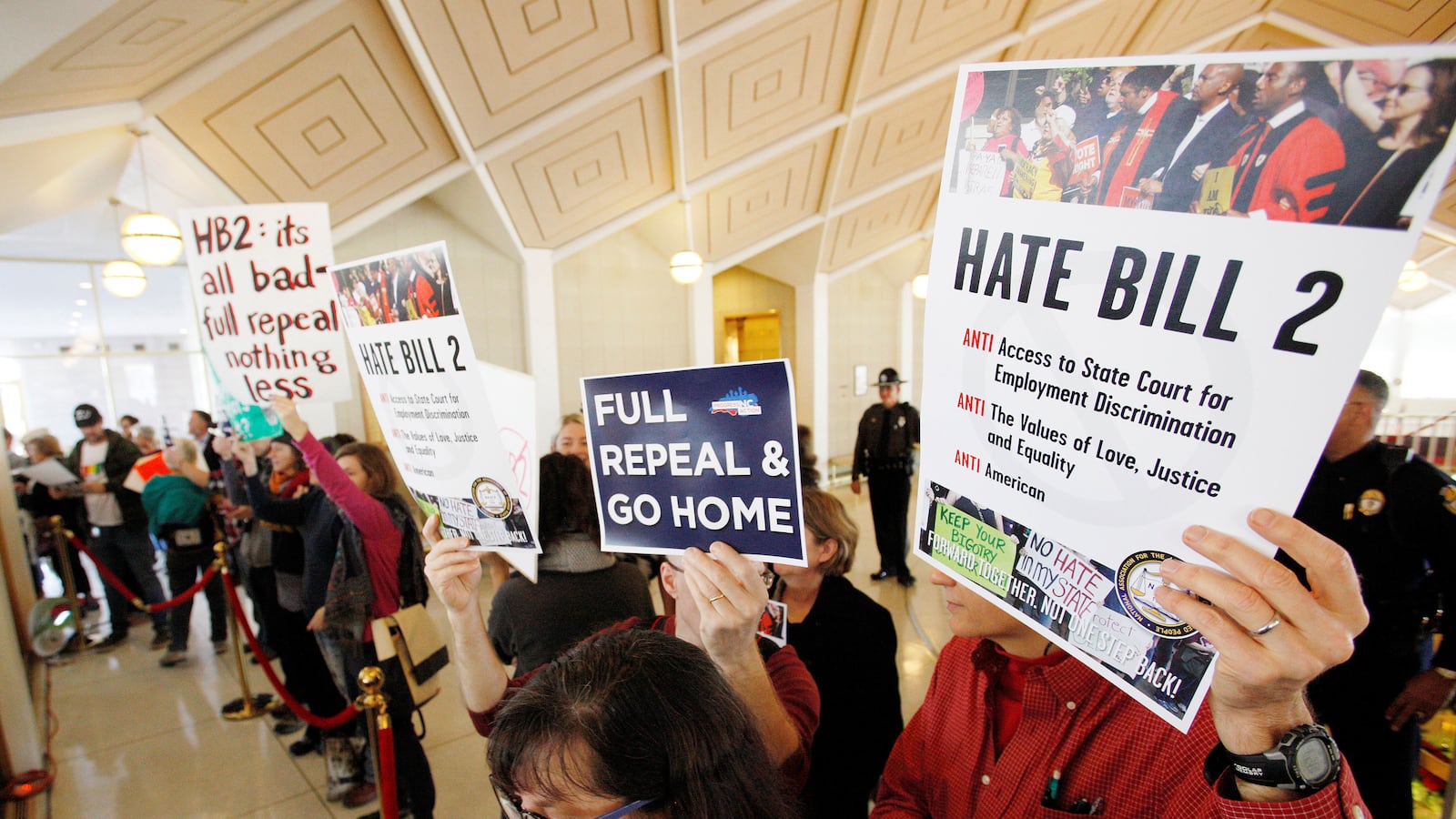After a chaotic day of legislative wrangling, the North Carolina legislature failed to repeal HB2 law, the state’s controversial so-called bathroom bill, even after it had been called into special session by outgoing Republican Governor Pat McCrory specifically to do just that.
Earlier this week, McCrory, who signed the bill into law in March, announced the special session after the Charlotte city council unexpectedly voted to repeal a local ordinance banning workplace discrimination, including a provision that allowed men and women to use the restroom of the gender they identify with rather than the gender specified on their birth certificates. McCrory explained that because he viewed the original Charlotte ordinance as the impetus behind HB2, he would work to repeal the state legislation as a result.
But as the special session loomed Wednesday morning, Republicans legislators accused Charlotte lawmakers of trying to trick them into repeal, as word came that the city council had repealed only a portion of its larger city ordinance. When legislators filed into the North Carolina state capitol in Raleigh, no legislation had yet been filed to debate and no votes were scheduled.
The day quickly descended from confusion to chaos, as it quickly became clear that the route to repeal would not be smooth. GOP Sen. Jeff Collins declared the session unconstitutional and said he would vote against anything that came up for a vote, no matter what it was. Another GOP senator moved to adjourn the session entirely, but was ruled out of order.
The House and Senate met and adjourned, met and adjourned. A 10-minute Senate recess lasted for two hours. Members huddled in impromptu meetings on the floor and retreated to partisan caucus meetings behind closed doors.
A proposal emerged from Republicans to repeal HB2 entirely, but to delay the repeal for at least six months for what was characterized as a “cooling off” period. Democrats dismissed that as unacceptable and filed their own bill to repeal HB2 immediately, but complained it was never considered for a vote.
At 6:30 p.m., eight hours after the special session had begun, the Senate gaveled back into session with a proposal to split the bill into two parts—the first to repeal HB2 and the second to delay its implementation. Senate leader Phil Berger called it Republicans’ “good faith effort” to resolve the issue once and for all, and he accused some Democrats of wanting the repeal to fail.
“I am going to give you one more chance to erase that doubt,” he told his Senate colleagues. “This is our one and only opportunity to this point to show people whether you’re really serious about repealing HB2.”
But both Democrats and Republicans rose to oppose it. Republican Sen. Ralph Hise said the language was designed to let the Senate pass a bill few approved of “even though we do not have the votes.”
Democratic Sen. Angela Bryant said that a delayed repeal would be no repeal at all, so she would vote no as well. “It’s smoke and mirrors, it’s a mirage, it’s not real,” she said. “And I don’t know if you think the public is stupid or we’re stupid or who is stupid, but it just does not make sense.”
When the votes were counted, the repeal to HB2 failed the Senate and left legislators on both sides fuming.
Berger accused Gov.-elect Roy Cooper, a Democrat who defeated McCrory in November, of deliberately sabotaging the repeal effort the night before. “You know that Roy Cooper called every one of you and said don’t vote for that, even after I had conversations with several of you that said, ‘Sounds reasonable, makes sense, we ought to do that,’” Berger said. “I cannot believe this.”
But Sen. Dan Blue, a Democrat, scolded Republicans for calling the session at all, calling it “a tremendous and absolutely unforgivable abuse of our time.”
Democratic Sen. Floyd McKissick said the session has been a waste. “We came here to solve a problem that apparently nobody had any idea how to solve,” he said. “It is not normal to waste nine hours to accomplish nothing.”
With the state legislature adjourned sine die, HB2 will continue to be the law in North Carolina. The legislation has already been blamed for the state’s loss of company expansions and tens of millions of dollars in revenue from canceled conventions and sporting events, including the 2017 NBA All-Star game that had been scheduled to take place in Charlotte.
Speaking for nearly everyone involved, Sen. McKissick described the botched special session as a colossal missed opportunity that would only embarrass the state further going forward. “The worst part of this is that we are worse off now than we were when we arrived.”





